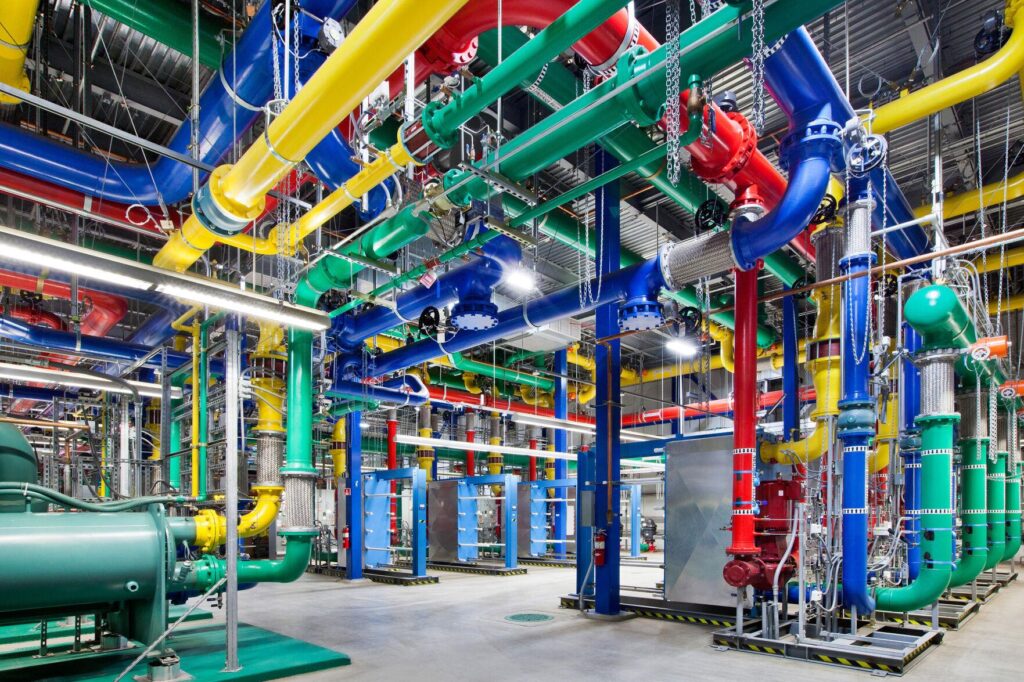Article and Images Orginally Seen On: Fauquier Times
It may be a Catch-22. At the least, it’s a head-scratcher.
Both Fauquier County and the Town of Warrenton require any data centers built in their jurisdictions to use recycled water for cooling. But neither Fauquier’s nor Warrenton’s wastewater treatment plants produce recycled water for data center use.
So how is this supposed to work? The answers range from murky to problematic to too-soon-to-tell.
Officials who run a data center in Vint Hill, approved in 2017, sent two answers to the Fauquier Times about what water they were using for cooling: first they said they used public water, though not a lot. Then they said they did not regularly draw from the groundwater. County officials have varying recollections of how the center planned to cool its servers, and the project’s plans don’t really address the issue.
Another data center is operating at the secretive Warrenton Training Center north of Warrenton. Adam Shellenberger, the county’s chief of planning, said because it is on federal property it was not subject to local approval and the county has no information on its cooling system.
A third data center near Remington, which has been approved but not yet built, had hoped to use county-supplied recycled water from a pipeline near its location. But the water is fully contracted to a nearby power plant, and is not treated to data center standards anyway. The center’s developer said the center will use air chillers instead.
All signs are that Amazon Web Services wants to build a data center on property it just acquired in the town of Warrenton. But it has not yet begun the application process, and since Warrenton does not supply recycled water, it is unclear how it would cool its servers.
The answers to some of these questions may lay in the meaning of “recycled water.” Most often it is interpreted to mean effluent from water treatment plants that is treated to a high level – though not so high as to be potable. Loudoun County, for instance, sends such recycled water to 35 data centers there. But memos from Fauquier and Warrenton officials suggest they may also allow data centers to re-circulate their cooling water in an in-house closed loop, though they would not allow replenishment of these systems from public water.
“You know, at the end of the day, the county wrote these regulations so nobody would build a data center. That’s what they wanted. They don’t actually want anything.”
Chuck Floyd
Civil engineer
Chuck Floyd, a former Fauquier assistant zoning administrator who has researched data center cooling as an engineering consultant said, “You know, at the end of the day, the county wrote these regulations so nobody would build a data center. That’s what they wanted. They don’t actually want anything.”
How cooling works in Loudoun and Prince William
All this will become important as the number of data centers expands in Fauquier. The industry is booming in Loudoun, which sends recycled water to half its data centers, and in Prince William, which supplies no such water and does not require its use. Fauquier’s data center industry is in its infancy, but there are signs it will grow. Besides Amazon’s recent acquisition in Warrenton, three Vint Hill parcels zoned for data center use were recently sold to a Lynchburg company.
Data centers are huge consumers of electricity and water. Their power demands pose a problem for the electric grid, but the power also heats up servers that must be cooled. And water is a very efficient cooler.
Data centers that use water for cooling can consume hundreds of thousands of gallons a day, and some use more than a million; that poses a threat to aquifers and reservoirs. So some communities have put limits on the amount of water the data centers can use, or require that they use recycled water.
The Fauquier County Water and Sanitation Authority does produce recycled water. About 15 years ago it began piping it to an Old Dominion Electric Cooperative plant near Remington for cooling. But according to Ben Shoemaker, the water district’s executive director, the water does not meet the standard for data center cooling.
That’s because in 2014 the state Department of Environmental Quality posted regulations for treatment and uses of reclaimed wastewater. Lesser-treated water, known as Level 2, can be used to irrigate sod farms, wash streets, or water livestock, for instance. The more intensely treated Level 1 water is to be used where there is potential for human contact, and that includes the air conditioning systems in data centers, Shoemaker said.
Loudoun Water was not thinking of data centers when it opened its Broad Run wastewater treatment plant in 2008, said Mark Peterson, the utility’s general manager. Because its discharge flowed into the Potomac River, it required a high level of treatment. But as data centers proliferated there, they were allowed to tap into the Level 1 water for their massive cooling needs. “It was a way to save potable water,” said Peterson.
Data centers in Fauquier County
In 2014, concerned over the potential of data centers to drain its aquifer, Fauquier County officials decided to allow data centers in its industrial zone but restricted them to using “recycled water for cooling” unless they obtained a special exception. Then, as now, the county was not producing Level 1 recycled water.
Three years later, the French company OVH was approved to renovate an 80,000 square-foot building at Vint Hill and turn it into a data center. The site plan notes: “Data Center – Using Recycled Water for Cooling.” But the application documents do not indicate how it would do so.
Rob Walton, then the county’s assistant zoning chief who signed off on the site plans, said his recollection is that OVH used a geothermal cooling system when it started.
Heather Jenkins, now assistant chief for zoning and development, said her understanding is that OVH had a closed loop cooling system that they initially filled up from water trucks, and could top it off the same way. “I am not aware of any refilling or replenishment of the cooling system from a Fauquier County water supply,” she wrote in an email. And OVH did not obtain a special exception to use anything other than recycled water.
Francois Sterin, chief industry officer of OVHcloud in France, said in an email Oct. 13 that the data center was “using water from [the] Fauquier County system.” He said the center used a closed-loop cooling method that used water “very responsibly,” at about one-tenth the rate of the industry average. “We are always looking at ways to reduce our environmental impact including water and will continue to look at ways to reduce our water usage,” he wrote.
The Times asked OVHcloud how much water it was using and whether it was using public water without a special exception. On Oct. 18, OVH wrote that it had neither requested nor received a special exception “because OVHcloud does not employ a cooling method that uses a regular or sustained draw from groundwater supplies for which an exception would be required.”
The Times asked the water authority for information on OVHcloud’s use of water at Vint Hill, but did not receive the information by press time.
Meanwhile, Floyd had moved from the county to an engineering firm that represented another property at Vint Hill. In 2018 he wrote to county officials asking about alternatives to using recycled water. Jenkins replied with a two-page letter stating that “recycled” meant re-circulating water, either rainwater, stormwater, grey water, or other treated effluent, “or water employed in a closed-loop type of system that does not require continual, regular, groundwater replacement.” She said other non-water cooling methods also were possible.
“And so, the county has basically said to data center developers, you need to tell us how you’re going to recycle this water. And we’ll tell you whether it works or not,” said Floyd.
When Point One Developments Ltd. applied in 2018 for a re-zoning of 234 acres east of Remington to build a six-building data center park, it faced a similar dilemma. Its plans said simply: “Data Center using recycled water for cooling.” Colin Clish, a partner and COO of the company, said initially they had hoped to tap into the recycled water that Fauquier’s water authority was sending to the ODEC plant, but they learned that ODEC had contracted for most of the water, 500,000 gallons a day. And, according to Shoemaker, the water’s quality is too low for data center use anyway.
“This system is quite efficient in the winter and less so in the summer. But the balance works out. Virtually no water is used.”
Colin Clish
COO, Point One Developments Ltd.
Point One decided to use air chillers, which use outside air to cool a closed loop of glycol – similar to a home’s central air-conditioning system. “This system is quite efficient in the winter and less so in the summer. But the balance works out,” Clish said. “Virtually no water is used.”
Future data center in Warrenton
On Aug. 10 the Warrenton Town Council passed a zoning amendment that would allow Amazon, or anyone else, to build a data center in its industrial zone. The amendment stipulates that a center use “recycled water or air chillers, in conjunction with using recycled water, for cooling purposes.” The town’s water comes mainly from a reservoir.
Walton, who is now the town’s community development director, said in an email that one option would be that Amazon could build a pipeline to the town’s wastewater plant. But since the plant is not producing Level 1 reclaimed water, it is not clear how this would work. A June 6 staff memo suggests another idea: a closed loop of cooling water with replenishment of what evaporates. But the zoning ordinance says “potable water shall not be used for cooling.”
“Are they just thinking, ‘Oh, data center? Yeah, we’ll just use recycled water,’ and haven’t really thought about the level of treatment to make that work?”
Julie Bolthouse
Piedmont Environmental Council
Julie Bolthouse, the Piedmont Environmental Council’s Fauquier land use representative, said perhaps Warrenton officials had just not thought it all through. “Are they just thinking, ‘Oh, data center? Yeah, we’ll just use recycled water,’ and haven’t really thought about the level of treatment to make that work?” she asked.
Floyd said the town and county should just forget the whole recycled water requirement: “I don’t understand why the localities just don’t enact zoning provisions that say, ‘You cannot use potable water for cooling. You figure out how you’re going to cool it.’” He said that in a world where technology was advancing every minute, that would make the most sense.
- A Peek at the History of PCBs - May 9, 2024
- Frequently Asked Questions When Hiring a Digital Marketing Firm - March 22, 2024
- Best Software for On Page SEO - March 22, 2024






